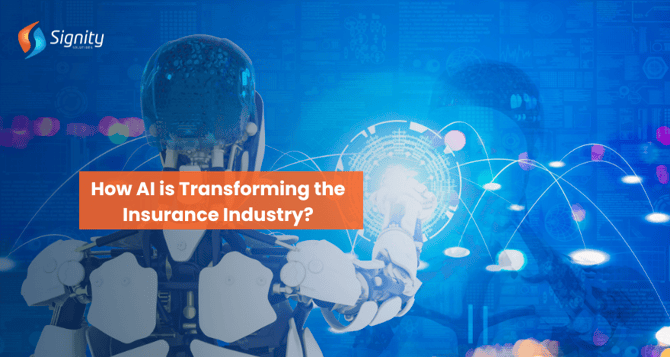How AI is Transforming the Insurance Industry?
Artificial Intelligence has a crucial role in the insurance sector. From protecting sensitive data to providing personalized insurance guidance, AI is a must. This blog is your complete guide to exploring the use of AI in insurance, as well as its benefits, trends, and challenges.

With the rising demand for insurance services and bulk data, security and quick response has become a critical topic in this industry. The cases of fraudulent activities in this industry are on a constant rise.
Businesses that still use traditional methods face numerous challenges like claim handling, customer interactions, and sensitive data protection. These problems make the need for AI insurance even more crucial.
So, what is AI in Insurance?
Artificial Intelligence insurance helps companies streamline operations, reduce human errors, and improve decision-making with data-driven insights. From personalizing customer services to providing instant support, the benefits of AI in insurance are numerous.
If you are into the insurance business, partnering with an AI insurance development company can help you get custom solutions.
Implementing AI techniques is crucial, as reports prove that AI in the insurance market is expected to reach USD 39.55 billion by 2034.

This blog is your complete guide to understanding AI insurance, its use cases, benefits, trends, and challenges.
Key Takeaways
- Efficiency Boost: AI streamlines claims, fraud detection, and customer interactions with data-driven solutions.
- Key Applications: AI powers automated claims, personalized pricing, and tailored customer support.
- Industry Benefits: Enhanced efficiency, better risk assessment, and improved customer satisfaction.
- Challenges Ahead: Data integration, cybersecurity, and regulatory compliance require careful handling.
AI Use Cases in Insurance
Artificial Intelligence insurance plays a number of roles in this industry. Its features has attracted insurance companies from across the globe and they plan to quickly adapt this technology.

The image above shows that companies plan to implement AI for various roles. Some other use cases of AI in the insurance industry include:
1. Automated Claims Processing
One of the greatest uses of AI in insurance is automated claims processing. It enables end-to-end insurance tasks like verifying claims, assessing damages, and processing payout swiftly.
It is especially impactful for auto insurance as AI-powered image recognition analyzes accident photos to determine repair costs accurately.
2. Telematics-Based Pricing
Another use of AI in insurance is telematics-based pricing. With telematics, insurance companies can analyze driver behaviour and vehicle usage to create custom policies for auto insurance companies.
Further, AI processes this data in real-time to ensure fair and dynamic pricing models. It also helps improve customer satisfaction and optimizes risk assessment for insurers.
3. Fraud Detection and Prevention
Artificial Intelligence insurance analyzes traditional and non-traditional data sources like social media activity, transaction patterns, and claims history to identify anomalies. It also helps prevent fraudulent activities across various policy types.
It also streamlines the claims process by verifying data accuracy and automating approvals to reduce turnaround times and assist in determining high-risk areas.
4. Best Offer Recommendations
AI-driven algorithms engage users by suggesting the next best offer based on customer behavior, preferences, and life events. It is particularly valuable for InsurTech startups aiming to upsell or cross-sell policies effectively.
These personalized recommendations not only enhance customer experience but also drive higher conversion rates and long-term customer retention.
5. Risk Assessment and Underwriting
Next, AI and insurance models integrate data such as climate trends, social media insights, and geolocation data to refine risk assessment. It makes underwriting more precise and efficient in the insurance company.
Hence, insurers can provide tailored coverage options to their customers, enhancing both customer satisfaction and operational accuracy.
6. Personalized Customer Experiences
AI chatbots and virtual assistants streamline customer interactions by handling end-to-end insurance tasks, from policy selection to renewal inquiries. These tools help InsurTech startups offer differentiated, customer-centric services.
Moreover, their 24/7 availability ensures prompt support, enhancing customer trust and driving higher engagement rates.
7. Predictive Maintenance and Loss Prevention
For auto insurance, AI in insurance analyzes telematics data to predict vehicle maintenance needs or potential accidents, enabling insurers to offer proactive solutions and reduce claims frequency.
The predictive approach not only minimizes risks but also fosters stronger customer relationships by emphasizing safety and preventative care.
8. Dynamic Policy Pricing
By continuously analyzing traditional and non-traditional data, such as market trends and customer behavior, AI enables dynamic pricing models that can adapt to changing conditions in real-time.
This agility helps insurers remain competitive while ensuring fair pricing, enhancing both profitability and customer loyalty.
Benefits of AI in Insurance
Now that you know the uses of AI in insurance, this section will highlight the benefits AI has for the insurance industry.

1. Enhanced Customer Support with Chatbots and Virtual Assistants
AI-powered chatbots and virtual assistants streamline customer interactions by providing instant responses, assisting with policy selection, and resolving queries, improving overall customer satisfaction. These tools are available 24/7 to ensure seamless support and build customer trust through reliable service.
2. Efficient Claims Handling
AI in the insurance industry automates claims processing by verifying documents, analyzing claims data, and detecting inconsistencies. Further, it reduces turnaround time and ensures faster resolutions. It also provides complete transparency in the claims process, enhancing customer confidence and loyalty.
3. Optimized Contact Center Operations
With the help of natural language processing, AI improves contact center efficiency by understanding and responding to complex customer queries, routing requests intelligently, and reducing operational costs. It allows human agents to focus on high-value tasks, improving overall service quality and efficiency.
4. Improved Fraud Detection
AI and insurance systems analyze large volumes of data to detect patterns and anomalies, enabling insurers to identify and prevent fraudulent claims across various policy types. Its real-time detection capabilities help insurers act swiftly, minimizing financial losses and operational disruptions.
5. Accurate Risk Modeling and Data Forecasting
Artificial Intelligence leverages predictive analytics to assess historical and real-time data, refining risk models and offering precise forecasting for better decision-making in policy creation. This empowers insurers to adapt to market trends quickly, staying competitive and profitable.
6. Streamlined Underwriting Process
AI automates the underwriting process by analyzing traditional and non-traditional data sources, such as telematics and geolocation data, to provide accurate risk assessments and tailored policy recommendations. This technology leads to faster policy issuance, enhancing the customer experience while reducing operational bottlenecks.
7. Proactive Telematics Integration
Lastly, AI evaluates telematics data to predict vehicle maintenance needs and assess driving behavior, enabling insurers to offer proactive solutions and improve risk management strategies. This approach not only reduces claims frequency but also promotes safer driving habits among policyholders.
Unlock AI’s Potential in Insurance and How it Can Benefit Your Business
Discover how AI can streamline operations, enhance customer experiences, and drive your business forward.
AI-Driven Innovations and Trends in Insurance
Explore the transformative impact of Artificial Intelligence on the insurance industry, from risk assessment to customer engagement and beyond.

-
Hyper-Personalization for Customer-Centric Experiences
AI makes hyper-personalization possible by evaluating lifestyle information, driving habits, and preferences. It provides individualized services and policies that are catered to the demands of particular clients.
-
Data Precision for Enhanced Decision-Making
More accurate risk assessments and pricing strategies result from insurers being able to extract actionable insights from data-driven analyses due to advanced AI algorithms that increase data precision.
-
Telematics Integration for Customized Insurance Premiums
Companies can create dynamic insurance premiums that incentivize safe driving practices by using telematics to assess real-time data on driving habits.
-
Tech-Enabled Innovations for Efficient Insurance Models
AI-driven tools and platforms simplify conventional insurance models, increasing their effectiveness and adaptability to current client needs, including automated underwriting and real-time claims processing.
-
Forward-Looking Perspectives in Financial Services
By forecasting future risks and market developments, AI offers forward-looking viewpoints that assist insurers and financial services in creating proactive plans to maintain their competitiveness.
-
Data-Driven Strategies for Personalized Service
AI allows insurers to adopt data-driven approaches to deliver personalized services. It helps improve customer satisfaction and loyalty through customized policy recommendations and proactive engagement.
Challenges of AI Implementation in Insurance
Integrating AI in insurance is not a simple task. Companies can face several problems, and some of these include:

-
Data Integration and Quality
AI systems require high-quality data for accurate predictions, but insurers often deal with fragmented and unstructured data. Integrating this data from legacy systems into AI platforms remains a significant challenge.
-
Cybersecurity and Privacy Concerns
The use of AI increases exposure to cybersecurity threats. Additionally, ensuring compliance with privacy laws and protecting sensitive customer information is critical in an industry that handles vast amounts of personal data.
-
Regulatory Compliance and Ethical Issues
AI applications must align with an evolving regulatory framework, and insurers must ensure fair and unbiased decision-making to address ethical concerns, such as potential discrimination in pricing or claims.
-
InsurTech Collaboration and Legacy Systems
Collaborating with InsurTech startups often requires modernizing outdated legacy systems, which can be costly and time-intensive but is necessary for effective AI implementation.
-
Unstructured Data and Regulatory Framework
AI must process unstructured data like social media insights or telematics, but ensuring this aligns with the regulatory framework while maintaining accuracy and efficiency adds complexity to the implementation process.
Get Next-Gen AI Insurance Solutions With Signity
The demand for AI in insurance is on the rise, and businesses must adapt these strategies quickly. At Signity, we can help you get custom AI insurance solutions that meet your and your customer’s demands.
From connecting faster with your clients to offering personalized insurance guidance, our AI experts will help you with advanced solutions. Get in touch with an experienced and talented team for complete support.
----------------------------------------------------------------------------------
Frequently Asked Questions
Have a question in mind? We are here to answer. If you don’t see your question here, drop us a line at our contact page.
What is the AI revolution in insurance?
![]()
The AI revolution in insurance refers to the transformative impact of artificial intelligence on the industry, enhancing efficiency in claims processing, underwriting, customer service, and fraud detection.
Can AI help detect and prevent insurance fraud?
![]()
Yes, AI uses advanced pattern recognition and anomaly detection algorithms to identify fraudulent claims in real-time, reducing financial losses for insurance companies.
How does AI improve customer experience in insurance?
![]()
AI-driven chatbots and virtual assistants provide instant responses, guide customers in choosing policies, and assist with claims inquiries, ensuring a seamless and satisfying customer experience.
How is telematics changing auto insurance with AI?
![]()
AI analyzes telematics data, such as driving behavior and vehicle usage, to predict risks, offer personalized premiums, and promote safe driving habits.
Can AI help insurers provide personalized policies?
![]()
Yes, AI uses customer data to analyze preferences, behavior, and life events, enabling insurers to create tailored policies that meet individual needs effectively.





